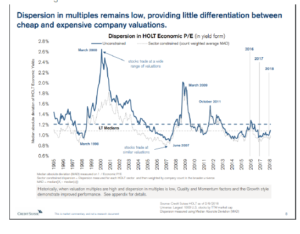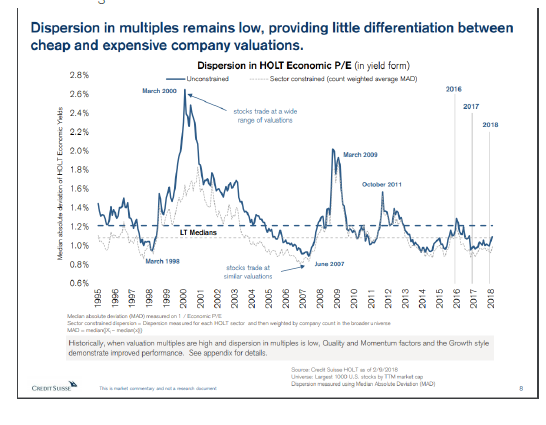Farnam Street Q1 letter to investors
Important Update We’ve learned a few things after studying successful investors and capital allocators for more than a decade. One fact unsinkable reemerges: investment committees rarely work. Groups of humans generally make sub optimal decisions together. There are instances where “the wisdom of the crowd” holds, but group think is the most likely destination. As Sir Alec Issogon is famously said, “A camel is a horse designed by a committee.” Even at Berkshire, Warren doesn’t consult Charlie before agreeing to a multi billion dollar agreement. The buck stops with Warren. Nobel Prize winner Daniel Kahneman, the godfather of behavioral psychology, lamented, “There are many biases, and I certainly do not claim to be immune from them. I suffer from all of them. We tend to favor our hypotheses. We tend to believe that things are going to work, and sometimes we delude ourselves in believing our conclusions.” Suffice it to say that if Kahneman isn’t immune, none of us are. FSI is not exempt from the occasional camel design. The two guys running the show have a lot in common, which makes for a blessedly strong partnership. But we also have overlapping blind spots and can effectively persuade the other when we feel passionate about an idea. That can be dangerous. With all of these dynamics in mind, we’re making a few changes going forward. Jake’s focus and responsibility will be on managing the retirement accounts (aka separately managed accounts). Lonnie will concentrate on our hedge fund, The 5505 Fund. We’ll still have each other as sounding boards, but the buck will stop squarely in each person’s area of responsibility. We think this gives us the best chance at serving FSI’s clients to the best of our abilities. This news likely doesn’t mean much change for your client experience as part of the Farnam Street family. We’ll still be showing up to the same office and studying businesses and great investors. But there will be no hiding who is responsible for each investment dollar. Plus we favor disclosing everything we’d want to know if our roles were reversed. If you have any further questions, we’re happy to field them. On with the quarterly letter…
Wall Street Now Allowing Twitter Via Bloomberg Terminal
Lobsters, Buddhism, and Warren Buffett
The b o t tom of the ocean, 350 million year sago. Two lobsters are engaged in claw-to-claw combat over contested territory. They struggle,but the stronger lobster eventually wins. He struts proudly in victory. The defeated lobster sulks away.
Lobsters as a species are really old. They ’ve been around more than five times the distance in time between humans and dinosaurs.They’re older than trees. Yet we share some interesting brain chemistry with lobsters. We’ll
get to that, but first…India, 2500 year s ago. A prince named Siddhartha Gautama was born into a wealthy family. His overprotective father shelteredthe young prince from every ugliness in the world. Siddhartha lived as a prisoner of comfort. Eventually,he was old enough to tour the countryside of his father’s kingdom. He was shocked by what he found:sickness, old age, death, homelessness. These were foreign concepts to him, and seeing people suffer sent him into a deep depression.
Siddhartha decided he would go on a spiritual quest to find a cure for all the suffering. He left behinda life of opulence, along with his wife and newborn child. He renounced all the trappings of royalty and embarked on six years of self-denial, living in the forest. He nearly starved himself to death in theprocess. He eventually found his way under a fig tree, later renamed the Bodhi tree (Bodhi meaning“enlightenment”). Siddhartha was determined to sit in meditation until he’d unraveled the mystery ofsuffering. After seven days of quietly battling his inner demons, he cracked the code. He achieved enlightenment and ascended to the Buddha at the age of thirty-five. Buddhism was born.
The Buddha started teaching others to help them alleviate suffering. He pursued that mission for the restof his adult life. After decades of selfless and compassionate service, he passed away contentedly atthe age of eighty. He left behind a community (called the “Sangha”) who taught future generations andexpanded on the Buddha’s principles as they spread around the world.
As with any oral history, arguments of veracity and exaggeration are unavoidable. Yet that shouldn’t stopus from looking for mental models that might help us as humans. (And investors!)
Time is the ultimate laboratory. Buddhist precepts are practiced by 300 million people today, and haven’tbeen discarded after 2,500 years of trial-and-error. That’s a good sign there could be something to learn.
If the concepts didn’t help, we would have already tossed them into time’s dumpster.
There are several important insights from Buddhism for the thoughtful investor. We’re apt to explore morein future letters, but for now, we’re going to focus on just one.
But first, back to the ancient seafloor. After winning the battle, our victorious lobster had a specificchemical coursing through his body. That chemical was serotonin, and it made him feel good aboutwinning and claiming his territory. The female lobsters were now very interested, sending romantic gestures his way. The winner had risen in the lobster hierarchy and would be passing on his fit genes tothe next round.
Our defeated lobster had measurably lower levels of serotonin, even visibly bad lobster-posture. He lost theterritory and mating opportunities. He was now more prone to illness, destined for the genetic scrap bin.
Evolution uncovered a chemically-ensured mechanism for survival of the fittest. Nature is hard, buteffective. Lobsters are fueled by serotonin to battle for food, territory, and mates. They ruthlessly sortthemselves into hierarchies, driven by chemicals. This sorting is an ancient process that’s older than most known species. It’s shared by all social animals, deeply rooted in the genetic architecture.
Including the DNA of humans.
Aging Infrastructure Accelerates Water Crisis
We’re not as different from lobsters as you might expect. The same serotonin chemical courses throughour blood, triggered when we rise in the hierarchy. It’s both a curse and a blessing that we’ve attainedself-consciousness and can recognize the chemical machinations of evolution.
Much of the human action we see in the world can be explained by deeply embedded scripts
designed to sort us into hierarchies.
We’re comparative animals. The living standards have been objectively raising around the planet for hundreds of years. Yet the old adage still holds true: “Being wealthy is making slightly more money than your brother-inlaw.”We’ll go to extraordinary lengths to claw our way to the top.
This likely explains why heavy social media usage leads to lowered measured happiness. (Aside from Russian hacking and playing fast and loose with our data.) When you were in a hunter-gatherer tribeof 150 people, you had a chance at being good enough at some skill to be happy with your status. We sorted ourselves, but we were all bonded in the shared fight for survival. We also saw our tribe members triumphs and struggles, up close in real time. It was a balanced view of the human experience.
Social media thrusts you into a tribe of billions. Now your “teammates” are curating and filtering their experiences through their smartphones for your viewing. [#nofilter, #blessed] Good luck triggering thehappy feelings of serotonin in your comparisons. You’ll never be rich enough, smart enough, thin enough,well-read enough, pretty enough, funny enough, traveled enough, or eat enough fancy food to feel at the top of the social media hierarchy. It’s literally a one-in-billions proposition. Unhappiness is your most mathematically-likely outcome.
What’s the answer? It just might lie in understanding the connection between lobsters and Buddhism:Don’t play their game.
It’s easy to copy Warren Buffett buying Berkshire Hathaway’s holdings
Is it possible that after years of quiet meditation, Siddhartha’s key insight was to simply opt out of the Serotonin Matrix? To train his mind enough to not play the comparison game that was making everyonemiserable?
A Tibetan Buddhist teaching says what causes suffering is a pattern of how we relate to others: “Envytoward the above, competitiveness toward the equal, and contempt toward the lower.” Sounds an awfullot like the dark side of social sorting.
Perhaps Siddhartha sat long enough to develop the truly outside perspective: everyone is suffering,stuck in evolution’s sorting game. But they don’t have to be, if they can find a way to follow their InnerScorecard. He dedicated the rest of his life to helping others opt out.
“The big question about how people behave is whethe r they’ve got an Inner Scorecard or an Outer Scorecard. It helps if you can besatisfied with an Inner Scorecard.”— Warren Buffett
Google, Facebook in Senate Hearings A Historic Benchmark
At last, we come to the implications for the humble investor. Warren Buffett seems to have an innate understanding of the inner- vs. outer-scorecard. This was likely inherited from his father, Howard, who was by all accounts an unshakably principled man (and four-term Congressman). The apple didn’t fall far from the tree. From Warren’s common sense investment approach, to his nuanced political views, to his“interesting” marital status, the Oracle has always lived life on his own terms. It’s served him well– we’d argue his tap dancing to work every day has nothing to do with his wealth.
Investing is a domain ripe for comparison because of all the numbers. It’s easier to compare 10% vs. 5%,than say apple vs. orange, or green vs. chartreuse. The Outer Scorecard in investing is brightly visible.
How much did you make last year? The financial press exists to tell us who’s hot and who’s not.
The truth is, we’re all humans. We’re all suffering, trying to do our best as we oscillate between fear and greed. Even the investing gurus you read about are humans.
Dogen, a thirteenth-century Zen master, said that to study Buddhism is to study the self.
“The investor’s chief problem—and even his worst enemy—is likely to
be himself.” – Benjamin Graham, Warren Buffett’s mentor
If we can control our own minds, we stand to gain everything.
It’s disturbing how awful we are to each other. The chase of serotonin as we climb and fall in the grand sorting game reveals humanity’s less flattery sides.
One of the best feelings is when something we own goes up in price. I knew I was a genius! Of course this was going to work! Why do they say investing is hard?
And it always hurts when something we own declines in price. This seemed like such a layup. Why is everyone selling? Should I sell too? What am I missing? Will I be left holding the bag?
One of the worst feelings is when we see other people making easy money. It doesn’t matter whether it was tulips in 1636, the South Seas in 1719, Japanese stocks in 1988, tech stocks in 1999, Florida condos in 2005, Bitcoin in 2017, and who knows what tomorrow. FOMO is inseparable from the human condition. I have to buy; I can’t stand to miss out. Everyone’s getting rich except me!
The schadenfreude in the investment industry is grotesquely palpable. We love to see others crash and burn, the bigger the better. Serves them right. I knew I was smarter. They were greedy and didn’t understand the risks they were taking.
Li Lu’s Big Non Short
But what if we decided to stop playing this awful game?
Six ways to opt out of the financial sorting game
1. Spending less than you earn is the real key to wealth building. If you do your saving correctly, anyinvestment returns are the cherry on top. The right savings plan will reduce uncertainty and yourdependence on returns. Find a way to enrich, rather than rob, your future self.
2. Pick a strategy that makes sense to you and stick with it. Some people like to buy high-qualitycompanies, some dividend-paying. Others are like us and prefer stocks on sale with a margin ofsafety. Like the seasons, every investment approach has its spring bounty of good returns and coldwinter where it will test your patience. The investors who really lose are the ones who chase what isrecently hot and never catch the rebound. Don’t be that person.
3. Create an investment plan and follow it. Without a plan, you’re subject to the ebb and flow of fearand greed. As General Patton said, “A good plan violently executed now is better than a perfect planexecuted next week.” It doesn’t have to be complicated. Automated is preferable as you only haveto make a smart decision once and you benefit for years. Time is your friend, so the earlier you start,the better.
4. Accept that others may get rich faster than you. And that’s OK! They may also be taking risksyou can’t see and will crash and burn before the finish line. Who knows? “Run your own race” andavoid the pitfalls of envy. It’s especially important to use debt judiciously. “Over the years, a numberof very smart people have learned the hard way that a long string of impressive numbers multiplied by a single zero always equals zero.” – Warren Buffett5. Ignore the financial press. Their real objective is to sell advertising, not provide you with usefulinvestment information. You won’t miss the noise; the signal is elsewhere. “Investing is one of thesimplest fields run by people who believe in their souls that they’ll do better if they make it morecomplicated.” – Morgan Housel
6. Practice compassion. The odds are overwhelming that if you’re reading this, your quality of life isin the upper 90%+ of all people in the world. Recognize your good fortune– it didn’t have to be thisway. Instead of coveting others’ returns or money, point your creativity toward easing the sufferingof the less fortunate. It’s all but guaranteed to provide you with a better ROI.
Artificial Intelligence To Grow 5X By 2021, Don't Panic… Yet: JPMorgan
A Market Update in Four Charts and Four Quotes
1. Everyone knows we’re in a bubble.
“In a speculative market, it’s not the understanding o f valuation, o reconomics, or a century of market cycles that gets you into trouble.It’s the assumption that anyone cares.” – John Hussman
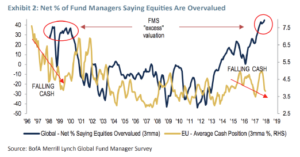
2. Yet FOMO keeps everyone fully invested.
“As long as the music is playing, you’ve got to get up and dance. We
are still dancing.” – Chuck Prince, former CEO of Citibank in July 2007, just before
the crash that required massive bailouts for his company.
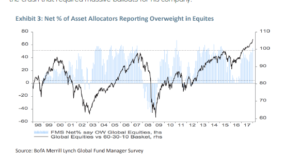
3. Everyone thinks they’ll be able to get out in time. (Seventy percent of fund managers
believe the market will peak in 2018.)
“Today’s is a cynical bubble, built not on faith in a new era, b ut onoveroptimism about the ability to get out before everyone else.”
– James Montier
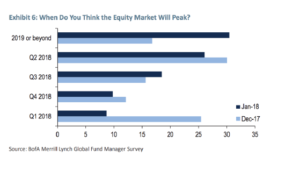
4. With little difference between the most expensive and cheapest valuations, it’s
not a favorable environment for bottom-up stockpickers. (We long for the days of 2000
and 2009 when there was a deep pool of attractive investment candidates.)
“The wise ones bet heavily when the world offers them opportunity.
They bet big when they have the odds. And the rest of the time, they
don’t… Look at lots of deals and don’t do almost all of them.”
– Charlie Munger
